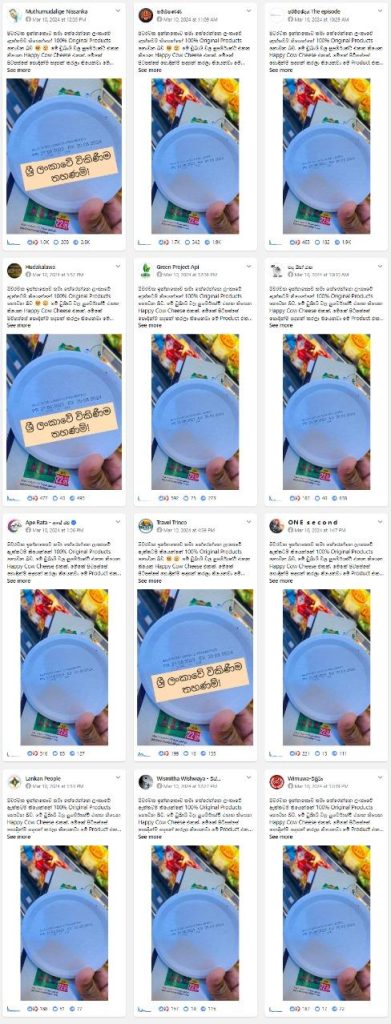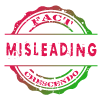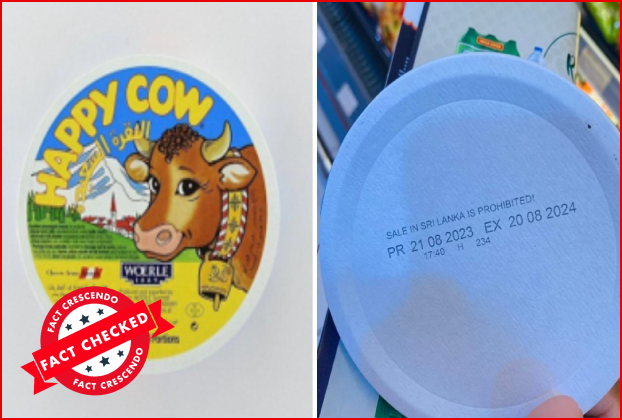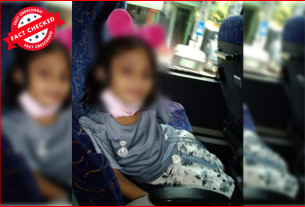දිනපතා සත්ය කරුණු දැන ගැනීමට අපගේ WhatsApp චැනලයටමෙතනින් එකතුවන්න.
‘Happy Cow’ cheese from Austria has established a significant market share in Sri Lanka and several parts of the world. A series of viral posts recently questioned the quality of these cheese products coming to Sri Lanka by citing a label at the back of ‘Happy Cow’ products saying, “Sale in Sri Lanka is Prohibited.” Let’s look at the claim in detail.
Social Media Posts:
A recent social media post highlighted the packaging of ‘Happy Cow’ cheese in the Dubai market, which includes a printed statement of “Sale in Sri Lanka is Prohibited” on the backside of the package.
“Only when you are in a foreign country do you realise that Sri Lanka doesn’t have 100% Original Products 🥺 😢
This is a Happy Cow Cheese in a supermarket in Dubai. Behind this, it is well mentioned that this product is prohibited from being sold in Sri Lanka. I don’t know why this is direct. (Because the consumer doesn’t know the inter-business goals. ) However, as a customer, since Happy Cow Cheese was given to children in Sri Lanka for years, there is a difference in taste between that cheese in Sri Lanka and the cheese in Dubai. I know from experience that there is more taste here than the cheese in Sri Lanka.
The quality of that product in Dubai is very different from that of Sri Lanka when you buy not only cheese but also Maliban, Munchi Chocolate Biscuits, and Lemon Puff. The same product made in Sri Lanka is posted in the market cheaply, but it is loaded abroad with excellent quality. Why is it tasty here than what is there to eat in Sri Lanka?
Not only that, even if you buy the price of goods, we buy the same product made in Sri Lanka that you eat in Sri Lanka at a price less than the price of Sri Lanka.
Not only biscuits but also tea types are the same. Some bosses drink tea in Sri Lanka, but we haven’t seen or heard of it when we were in Sri Lanka. However, they are the leading tea manufacturing companies in Sri Lanka. Are the only mixes made in Sri Lanka available here in restaurant hotels? They can’t even be found in any supermarket shops in Sri Lanka. Even if it is the kind of milk powder, it is the same. The best are in these countries, but the products come to Sri Lanka with less quality.
There are many high-quality things made in Sri Lanka and sent abroad, but some of those products are very low quality in Sri Lanka. No matter how much you earn and drink in Sri Lanka, Sri Lankan people are pitiful because they eat less quality. The best tea in the world is in Sri Lanka, but Sri Lankan people drink it like garbage tea. The best of most things made in Sri Lanka go abroad; the cheap ones are given to Sri Lankans.
It’s better to bring their family to the country where they live than to earn money and send money to their family. Why? If it is like that, you can eat Quality Food.
If you still think that this is my country and my motherland, even if you die, live in a developed country for a month. Then you will realise that we have been deceived so far from a small place ✌ 🇱🇰
P. Li. This is the difference I directly experienced as a Sri Lankan-made consumer for sale in Dubai. Since I have eaten those things from Sri Lanka for many years, I am informed that the taste of it is fresh. So, I have seen better quality in Dubai than what I ate in Sri Lanka, which is available for sale in supermarkets. That’s what I realised, and that’s what I mentioned.
Copied-
Facebook | Archived Link Facebook | Archived
This information gained widespread circulation on Facebook in the following manner.

Users expressed diverse opinions on this matter.

We decided to contact the relevant parties to investigate the possible reasons for the main claim mentioned in these viral posts related to ‘Happy Cow’ cheese.
Fact-Check:
‘Happy Cow’ cheese originates from Austria. During the early 20th century, Johann Woerl started distributing solid and semi-liquid cheese forms to European customers. The business expanded, evolving to produce cheese that could be stored at room temperature without melting.
This family business persisted over the years, facing growing competition in the cheese market. In 1982, Gerhard Woerl introduced the Happy Cow brand, built on the belief that ‘happy cows produce the best milk.’ Since its establishment, Happy Cow cheese has been distributed to numerous countries from Austria, including Sri Lanka and Dubai.
Happy Cow cheese is in significant demand in the Sri Lankan and Dubai markets. The local markets offer various options for diverse preferences, including fat and non-fat cheese, cheese slices, mozzarella, cheddar cheese, and more.
Despite the controversy surrounding the cheese packaging, we analysed to identify similarities between the packaging in Sri Lanka and Dubai. Notably, these packages share striking resemblances, with the primary distinguishing factor being the language used (Sinhala and Arabic). Furthermore, we systematically examined the packaging across various supermarkets in Sri Lanka, confirming that essential details, including the expiration date, are consistently provided on the back.
Stassen Foods is the importing and distributing agent for Happy Cow products in Sri Lanka. We contacted Stassen Foods to get more insights about the viral Facebook posts.
General Manager at Stassen Foods
Mr Vigna Nadaraja highlighted that individuals often transport these products in their luggage from foreign locations like Dubai when arriving in Sri Lanka. He clarified that to discourage this trend of transporting cheese ‘Happy Cow’ products in bulk via personal luggage and the sale of these products in the local market, the label “Sale in Sri Lanka is Prohibited” has been incorporated.
Mr Vigna Nadaraja clarified that the decision to include “Sale in Sri Lanka is Prohibited” was made a few years ago and was prompted by several quality issues reported by customers on ‘Happy Cow’ products. Upon further investigation, it was identified that these complaints had mainly come through the sale of ‘Happy Cow’ products sourced via passengers from Dubai. After discussions with ‘Happy Cow’ in Austria, it was decided to incorporate this specific wording.
When questioned about the reasons for specifically mentioning Sri Lanka on the back of the packaging and quality concerns, the General Manager explained that products from the same batch of ‘Happy Cow’ production in Austria are being sent to Sri Lanka and Dubai, and the “Sale in Sri Lanka is Prohibited” text is added to the Dubai product line since the trend of passengers carrying these cheese products in bulk was mainly noticed via Dubai.
Therefore, given that Happy Cow products are sourced from the same batch for both Sri Lanka and Dubai, the General Manager emphasises that Happy Cow cheese products of identical quality are exported from Austria to Sri Lanka and Dubai.
Additionally, Vigna Nadaraja mentioned that Happy Cow products undergo no alterations in Sri Lanka and are imported under optimal conditions from Austria through Stassen Food’s secure containers, ensuring the required quality for cheese products. Furthermore, he explained that batches of ‘Happy Cow’ products undergo thorough inspections at customs, and the quality is ensured.
We have contacted the ‘Happy Cow’ in Austria for further clarification and anticipate updating this article with their response.
Consumer Affairs Authority
Responding to the consumer authority’s inquiry, a senior official explained that the “Sale in Sri Lanka is Prohibited” wording deters the sale of ‘Happy Cow’ products in the local market, which are transported in personal luggage from Dubai.
The official noted that approximately 8 to 10 years ago, several customer complaints were received about the quality of ‘Happy Cow’ cheese in the Sri Lankan market, with some of the products reported as spoiled. Upon investigation, it was observed that these were products sourced from a group of individuals who had brought ‘Happy Cow’ cheese from Dubai in their luggage in bulk and sold in the local market.
The investigation established that the quality of ‘Happy Cow’ cheese in luggage had deteriorated due to exposure to harsh temperature conditions without optimal environmental controls, leading to rapid spoilage.
In response to this problematic scenario, the consumer authority clarified that Happy Cow has initiated these markings on ‘Happy Cow’ cheese products destined for Dubai to deter the practice of such products being sold in Sri Lanka.
Food Control Administration Unit of the Ministry of Health
Mr Sumanaratne, the assistant director of the Food Control Administration Unit of MOH, highlighted the food quality concerns that arise when individuals travelling to Sri Lanka bring such cheese in their luggage and sell it within the country. He emphasised that items carried under such channels and entering the local market pose a risk to public health since they do not undergo the required quality and customs checks.
He further mentions that food items designated for sale within Sri Lanka undergo a thorough examination and conform to stringent legal regulations. Approval for the Sri Lankan market is granted only after authorisation by the Ministry of Health and Customs.
Considering the manufacturing and expiration dates, Mr Sumanaratne points out that food products intended for sale in the country with less than 40% shelf life are rejected. This means the food products must have at least 60% or more time available to be sold in the market for consumption from the manufacturing date.
He added that periodic raids are conducted in places where such inferior food products are being sold in the country. Instances have been reported where labels on goods from other countries fail to include essential information required by Sri Lankan laws and regulations, potentially not meeting local standards due to a lack of proper investigation or regulation. The overarching goal in such cases is to minimise any harm to the customer.
Disparities in the cost of Happy Cow cheese between Dubai and Sri Lanka markets!
We have compared the current prices of ‘Happy Cow’ products in Sri Lanka and Dubai to get an idea of the reasons for bulk luggage transportation in the first place.
The Happy Cow Cheese Round Box Portion 120g is listed at Rs. 784 on the websites of several supermarkets in Sri Lanka, including the official website of Stassen Foods. In contrast, the price is AED 5.45 (approximately Rs. 455) on a store’s website in Dubai. The General Manager of Stassen Foods was contacted regarding this pricing difference, and he attributed the higher cost in Sri Lanka to the substantial customs duty imposed on cheese products.
Read this article in Sinhala : ඩුබායිහී විකිණෙන ‘Happy Cow’ චීස්, ශ්රී ලංකාවේ විකිණීම තහනම් බවට සඳහන් කර ඇත්තේ ඇයි?
In a previous instance, viral social media posts suggested that chocolate puffs produced in Sri Lanka and sold in Qatar were unsuitable for children. We did a fact-check in Sinhala regarding that issue, too.
Follow us and stay up to date with our latest fact checks.
Facebook | Twitter | Instagram | Google News | TikTok
Conclusion:
Based on the investigation, the decision to put the “Sale in Sri Lanka is Prohibited” sticker was taken a few years ago to safeguard the consumers after noticing a trend of passengers coming via Dubai bringing bulk packs of ‘Happy Cow’ products and releasing them to local vendors.
These packs, which came in personal luggage, had been subjected to extreme heat and unfavourable conditions, resulting in quality degradation and leading to numerous customer complaints.
The Consumer Affairs Authority and Food Control Administration Unit in the Ministry of Health confirm that ‘Happy Cow’ products coming via the proper channel under the supervision of local agent Stassen Foods do not have this label and undergo constant quality checks.
Furthermore, Stassen Foods, the local agent for ‘Happy Cow’ cheese, states that cheese products to Dubai and Sri Lanka come via the same batch; hence, there is no difference in quality.

Title: ‘Happy Cow’ Products in Dubai displaying a notice saying, “Sale in Sri Lanka is Prohibited”? Find out the facts…
Fact Check By: Pavithra SandamaliResult: Misleading






